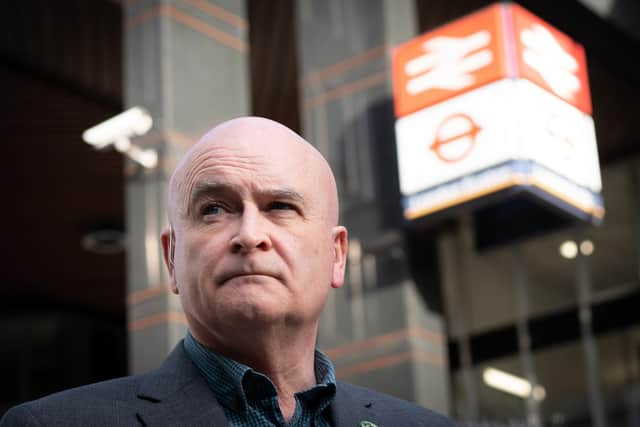A generation could shun rail travel forever due to the repeated train strikes - Jayne Dowle
The industrial action which has brought services to a standstill is particularly impacting younger people, who rely on trains to travel around the country and get to work, school, college or university.
This generation, whilst largely sympathetic to the original aims of the strikes, tends to be short on patience and tolerance.
Advertisement
Hide AdAdvertisement
Hide Ad"This [industrial action] is an act of self-harm - a generation of passengers will just write off the railways,” said the source. “We’re talking about permanent scarring. The longer the strikes continue, the greater the risk.”


Before Christmas, some 39 per cent of respondents to an RAC survey aged 18-24 said they had changed their festive travel itinerary due to industrial action on the railways, more than any other age category.
This age group felt particularly afflicted; across all demographics, 21 per cent of people said they had to readdress journeys to friends and family over the Christmas period.
More than half (51 per cent) of those young adults affected said they would be turning to private cars, with 28 per cent planning to drive themselves and 23 per cent getting a lift from someone else.
Advertisement
Hide AdAdvertisement
Hide AdJust 15 per cent said they would travel by other means such as coach. Only a trusting 10 per cent admitted that they were prepared to rebook onto a train service on a non-strike day.
I know about this generation. The under-25s are so fed up with the state of public transport, almost every teenager I know is learning to drive. I’m not sure how this will square with the Government’s pledge to make the UK zero carbon by 2050 - especially since the reputation of electric vehicles has suffered a setback due to the chaos at the charging stations over the Christmas break - but it’s the truth.
I was talking to a parent from Bradford recently and she told me that local driving instructors are totally overwhelmed with demand from teenagers; it took her days to track down an instructor with availability for her 17-year-old son.
And I was chatting with a younger colleague who works in central Leeds. He’s so sick of the unreliable, over-crowded and currently non-existent trains on his commuter route, he’s driving into work instead, paying exorbitant city centre car-parking fees and suffering delays and frustration as rush-hour traffic builds.
Advertisement
Hide AdAdvertisement
Hide AdMy son’s girlfriend, who came up from London to Sheffield via train last Friday, has to wait until next Monday - when hopefully services will have returned to whatever passes for normal - to return to her own home and university.
She normally travels up and down the M1 by cheap coach, but because of the knock-on effects of the rail strikes, these services are packed to the gunnels, stressful and uncomfortable, so she’s sitting it out.
These are not isolated protests; they are an onslaught. The Rail, Maritime and Transport (RMT) union staged a 48-hour walk-out on Tuesday, with another planned for tomorrow. Drivers from the Aslef union are striking today.
Rail industry sources have claimed that 16 million journeys could be affected this week, with an estimated 80,000 trains cancelled.
Advertisement
Hide AdAdvertisement
Hide AdWhilst RMT leader Mick Lynch argues for his own workers’ rights, he seems to have overlooked the fact that the post-Christmas return to normality of millions of other people will be impacted.
If you can work from home, carry on. But what of the retail workers, those in hospitality or on construction sites, who can’t do their job from the comfort of their home office?
Many of these will be young people who now find themselves stranded and broke, especially as they are already likely to be on low or apprenticeship wages.
Does Mr Lynch, who continues to accuse the government of blocking any deal and says that “unprecedented ministerial interference” is hampering the train companies in negotiations, not realise that his own obduracy could be the unmaking, not just of his authority, but of the very industry he seeks to protect?
Advertisement
Hide AdAdvertisement
Hide AdThese strikes clearly risk a decline in train journeys. This is bad for the rail industry, the environment and for all the millions of railway workers and associated businesses, such as station cafes, bars and retailers.
Travellers who come to adulthood suffering from endlessly unreliable train services will indeed abandon the iron horse, and engines and carriages will simply become museum pieces. Is that what Mr Lynch really wants? If this disruption carries on for much longer, the train will finally leave the station. Permanently.